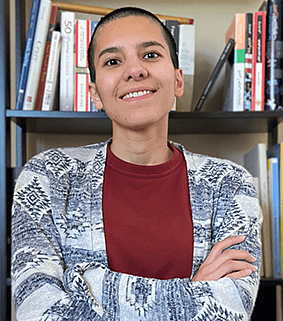
Parisa Hosseinzadeh, an assistant professor at the University of Oregon’s Phil and Penny Knight Campus for Accelerating Scientific Impact, has been awarded a $2.1 million grant from the National Institutes of Health’s Director’s New Innovator Award Program for her project, “A data-driven approach towards generation of permeable peptide therapeutics.”
A computational biochemist, Hosseinzadeh uses computer modeling to design synthetic peptides as potential drugs to treat challenging diseases.
Hosseinzadeh’s NIH project is focused on generating peptides — small chains of amino acids, the building blocks of proteins — as powerful, novel therapeutics Peptides can address some of the limitations of the most widely used therapeutic modalities, antibodies and small molecules — and could be the solution to fighting diseases such as cancer, new pandemics, and antibiotic-resistance.
“Peptides occupy a size range between antibodies and small molecules and can inherit the best of both worlds,” Hosseinzadeh said. “They can strongly bind to flat proteins as antibodies do and cross cell membranes to access intracellular targets as small molecules do.”
The process of developing cell-permeable functional peptides has been challenging due to a lack of high throughput methods to screen for permeability and limitations in accurate modeling of peptide behavior in solution. Hosseinzadeh’s project proposes a transformative method to predict permeability — a novel data-driven approach that combines state-of-the-art computational techniques, such as peptide modeling and machine learning, with experimental data generation to develop methods and datasets.
“The dataset generated during this work and methods we develop will be an important resource for many researchers interested in drug discovery, physics-based models of permeability, and will pave the way for the development of next generation cell-permeable peptide therapeutics.,” Hosseinzadeh said.


